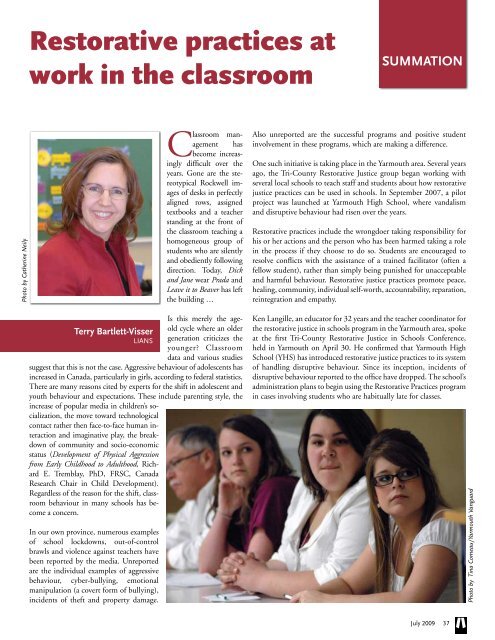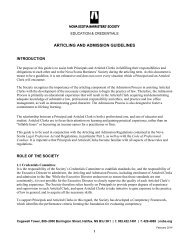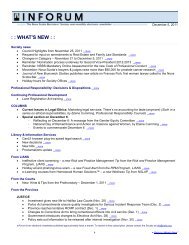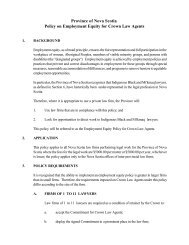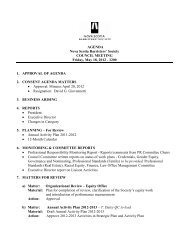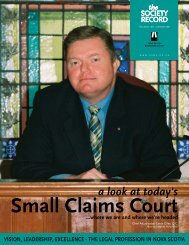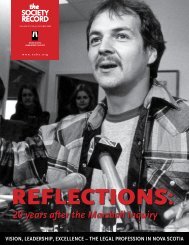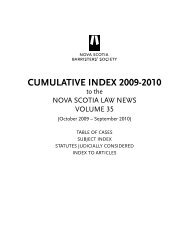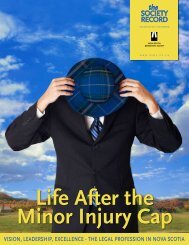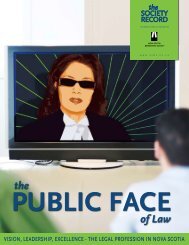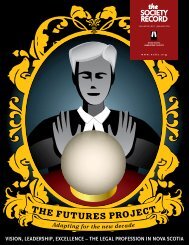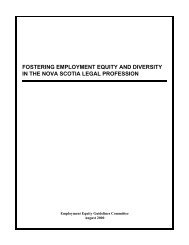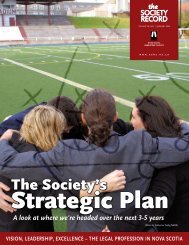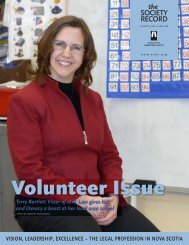SR Vol 27 No 3, July 2009 - Nova Scotia Barristers' Society
SR Vol 27 No 3, July 2009 - Nova Scotia Barristers' Society
SR Vol 27 No 3, July 2009 - Nova Scotia Barristers' Society
Create successful ePaper yourself
Turn your PDF publications into a flip-book with our unique Google optimized e-Paper software.
Restorative practices at<br />
work in the classroom<br />
Summation<br />
Photo by Catherine Neily<br />
Classroom management<br />
has<br />
become increasingly<br />
difficult over the<br />
years. Gone are the stereotypical<br />
Rockwell images<br />
of desks in perfectly<br />
aligned rows, assigned<br />
textbooks and a teacher<br />
standing at the front of<br />
the classroom teaching a<br />
homogeneous group of<br />
students who are silently<br />
and obediently following<br />
direction. Today, Dick<br />
and Jane wear Prada and<br />
Leave it to Beaver has left<br />
the building …<br />
Also unreported are the successful programs and positive student<br />
involvement in these programs, which are making a difference.<br />
One such initiative is taking place in the Yarmouth area. Several years<br />
ago, the Tri-County Restorative Justice group began working with<br />
several local schools to teach staff and students about how restorative<br />
justice practices can be used in schools. In September 2007, a pilot<br />
project was launched at Yarmouth High School, where vandalism<br />
and disruptive behaviour had risen over the years.<br />
Restorative practices include the wrongdoer taking responsibility for<br />
his or her actions and the person who has been harmed taking a role<br />
in the process if they choose to do so. Students are encouraged to<br />
resolve conflicts with the assistance of a trained facilitator (often a<br />
fellow student), rather than simply being punished for unacceptable<br />
and harmful behaviour. Restorative justice practices promote peace,<br />
healing, community, individual self-worth, accountability, reparation,<br />
reintegration and empathy.<br />
Terry Bartlett-Visser<br />
LIANS<br />
Is this merely the ageold<br />
cycle where an older<br />
generation criticizes the<br />
younger? Classroom<br />
data and various studies<br />
suggest that this is not the case. Aggressive behaviour of adolescents has<br />
increased in Canada, particularly in girls, according to federal statistics.<br />
There are many reasons cited by experts for the shift in adolescent and<br />
youth behaviour and expectations. These include parenting style, the<br />
increase of popular media in children’s socialization,<br />
the move toward technological<br />
contact rather then face-to-face human interaction<br />
and imaginative play, the breakdown<br />
of community and socio-economic<br />
status (Development of Physical Aggression<br />
from Early Childhood to Adulthood, Richard<br />
E. Tremblay, PhD, FRSC, Canada<br />
Research Chair in Child Development).<br />
Regardless of the reason for the shift, classroom<br />
behaviour in many schools has become<br />
a concern.<br />
In our own province, numerous examples<br />
of school lockdowns, out-of-control<br />
brawls and violence against teachers have<br />
been reported by the media. Unreported<br />
are the individual examples of aggressive<br />
behaviour, cyber-bullying, emotional<br />
manipulation (a covert form of bullying),<br />
incidents of theft and property damage.<br />
Ken Langille, an educator for 32 years and the teacher coordinator for<br />
the restorative justice in schools program in the Yarmouth area, spoke<br />
at the first Tri-County Restorative Justice in Schools Conference,<br />
held in Yarmouth on April 30. He confirmed that Yarmouth High<br />
School (YHS) has introduced restorative justice practices to its system<br />
of handling disruptive behaviour. Since its inception, incidents of<br />
disruptive behaviour reported to the office have dropped. The school’s<br />
administration plans to begin using the Restorative Practices program<br />
in cases involving students who are habitually late for classes.<br />
Photo by Tina Comeau/Yarmouth Vanguard<br />
<strong>July</strong> <strong>2009</strong> 37


